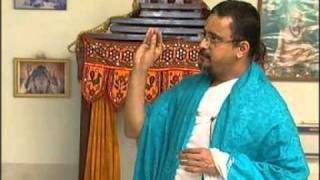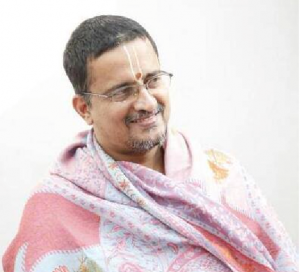This series chronicles interesting experiences recounted by the devotees of HH Maharanyam Sri Sri Muralidhara Swamiji. These articles are translations from the series, “Madhuramaana Mahaneeyar” that is published every month in Madhuramurali Tamil monthly magazine. The original article was written by Dr. Bhagyanathanji, Personal Secretary of Sri Swamiji.
Sri Swamiji’s valuable insights for All Teachers
 On March 15, 2018, several school correspondents, principals, and teachers led by Mr. Meenakshi Sundaram, from the Vivekananda Educational Trust schools gathered at Madhurapuri ashram to have darshan of Sri Swamiji. Sri Swamiji’s conversation and answers to the questions raised by them hold valuable insights for the teacher-student community.
On March 15, 2018, several school correspondents, principals, and teachers led by Mr. Meenakshi Sundaram, from the Vivekananda Educational Trust schools gathered at Madhurapuri ashram to have darshan of Sri Swamiji. Sri Swamiji’s conversation and answers to the questions raised by them hold valuable insights for the teacher-student community.
Q: Our education system teaches the students about our Sanatana Dharma, culture, traditions and values. After graduation, we see that the students tend to forget about these values that were seemingly ingrained in them. It is disheartening that they do not exhibit even a trace of what they have learnt at school in their lives. Why does this happen after all the emphasis that is laid in the school years?
A: The beauty of Sanatana Dharma is that it has the entire spectrum of instructions starting from the trivial everyday life tasks to the highest goal of attaining God. Every principle of Sanatana Dharma has a profound meaning to it. It has been codified after carefully considering our individual well-being, the community’s well-being, and the environment and world’s well-being. Every principle reflects an in-depth knowledge of scientific truths, nature of the mind and the appreciative tendency of our ancestors. When a young child asks us a question, we threaten the child saying that ‘God will stab your eye!” when we do not know the answer to the question or when we do not have the intention to investigate further on the topic. Instead, if we reveal the underlying truth to the young minds, they will appreciate it.
Bhagavad Gita says,
sreyo hi jnAnam abhyAsad jnAnAd dhyAnam visishyate
dhyAnat karma-phala-tyAgah tyAgAt shAntir anantaram
Knowing the reason behind why we are doing something is important. Arjuna says that doing it selflessly takes precedence over this knowledge. Understanding the reason behind each and every action sows a seed in the intellect of the students. After graduation, you don’t have to worry about the intractable ways of the students influenced by the world. As years go by, there will be a time when they get tired of their untoward behavior. At that moment, the intellectual seeds sown by the teachers such as you will flourish and guide them. The knowledge instilled in the young minds during their school years is never ‘wasted’.
Q: Often students raise this question: “You teach us about our duties and responsibilities, ask us to be truthful, and tell us not to cheat anyone. What will we achieve in life holding on to these ideals?” What is your answer to this question?
A: The current trend in the world prompts this question among students. Today, success is defined as money and power, even if these entities are acquired wrongfully via lying, cheating or avoiding responsibilities. However, there is much more that we do not see. Many people at top of the social ladder, successfully feign an external facade of happiness while leading an internal struggle of agitation and distress. Mental peace eludes them. The inner clarity and excellence found in an honest, unselfish man is foreign to some of these “successful” people. Money, fame or education alone seldom provide the means for mental peace. As teachers, you should impart that the measure of success is internal peace and clarity and not simply riches and fame. Internalizing this at a young age will guide him/her at the right moment in their lives.
Q: What can we do to make sure that the younger generation remembers and follows the ideals taught to them in their school years?
A: We tend to take for granted the things that come to us easily, compared to the things we make sacrifices to attain. For the younger generation to live by the ideals taught to them, they must understand its worth. Today, we receive many things without our own effort, and hence, we do not appreciate them. For example, we automatically go about the mundane chore of washing and drying out clothes in the sun. Do we pause to think even for a moment, which galaxy the sun belongs to, how big it is, what is it comprised of, and how its heat and light energy have sustained us for ages on the Earth? No. Instead we leave our clothes out to dry, simply because the sun is out. Another example is the freedom we enjoy, a result of the efforts and countless sacrifices of our predecessors. When India was under the rule of the British Empire, many gave up their lives in the prisons of the Andaman Islands, Jallianwalabagh, and other locations to provide the freedom we enjoy today. Soldiers who protect our country’s borders work day and night, sacrificing their comforts to protect our freedom. We need to remind the younger generation of these sacrifices, so the lessons they learn have a greater impact on their lives. This will help them appreciate what they have and also follow what is taught to them.
Q: In today’s fast-paced, uncertain world, how can a lesson in a small remote classroom bring about change?
A: Teachers can reform the world. Do not underestimate the impact the teachers can make in the lives of their students. A community is made up of a leader and a number of followers. The leader can influence others to bring about change in the world. Mahatma Gandhi was instrumental in India’s independence. He achieved this by following the path of dharma – without the support of an army, the wealthy or the powerful. Modern world leaders continue to follow his philosophy. How is this possible? What he learned in a remote classroom paved the way to reform our country, and consequently, the world. Every teacher is an architect of the future for the world. The spark that they ignite in the student makes him/her a leader. That leader creates a turning point in world history.
Dr. Bhagyanathan, personal secretary to His Holiness Sri Sri Muralidhara Swamiji
Originally published in MadhuraMurali Tamil monthly magazine, May 2018 issue.

